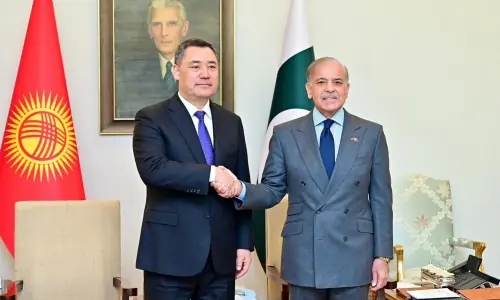ISLAMABAD: Despite unprecedented hike in international oil and gas prices and resultant increase in import bill of two essential commodities, the two gas utilities have failed to control system losses against regulatory targets approved by the government.
Over the last three years (2019-22), both the gas utilities — Sui Southern Gas Company Limited (SSGCL) and Sui Northern Gas Pipelines Limited (SNGPL) — have not been able to achieve loss reduction targets (unaccounted for gas, better known as UFG) set by the Oil & Gas Regulatory Authority (Ogra) and approved by the federal cabinet, according to a three-year performance report released by the petroleum division.
Pakistan LNG import bill surged by 91pc in fiscal year 2021-22 ending June 30, 2022 to $4.99bn when compared to FY2020-21 as global prices made new records even though the number of LNG import cargos remained on the lower side. Pakistan’s total petroleum sector imports also jumped to $23.32bn in July-June 2021-22, up 105pc 96pc. Besides direct imports, the prices of country’s domestic gas and crude are linked with international crude prices.
Between FY2019-20 and 2021-22, the SSGCL was required to reduce its UFG by 9.55pc but it completely failed as its actual losses slightly increased over the period. Over the same period, SNGPL failed by a thin margin of 0.2pc to meet its target of cutting losses by 4pc.
However, in overall terms, the gas losses of SSGCL remained unchanged at 17.2pc with a slight increase of 0.1pc over the past three years as the Karachi-based gas utility could not achieve its targets for two of the three years. It is said around “0.5 million unauthorised consumers are using gas in Karachi city”.
On the other hand, the SNGPL reported its losses went down by 3.8pc from 12.32pc in 2019-20 to 8.06pc in FY2021-22 but it also failed to achieve its annual loss reduction targets for two out of three years.
“In FY2019-20, the volumetric loss of the SSGCL decreased by 4,022MMCF (million cubic feet), against a target of 7,965MMCF. The percentage UFG has hardly changed” as compared to a year earlier, the report said, adding that during FY2019-20, UFG activities were hampered due to Covid-19 lockdown. In the following fiscal year, the SSGCL’s UFG decreased by 13,135MMCF against the target of 10,462MMCF while percentage UFG also decreased by 1.9pc.
“However, in FY2021-22, the volumetric loss of the SSGCL increased by 2,407MMCF, against the reduction target of 12,202MMCF. The percentage UFG has hardly changed” and stood at 17.2pc as it was before FY2019-20. SSGCL tried to hide its poor performance for increasing UFG in its system to last year’s harsh winter season in Balochistan saying the indicators of socio-economic development in that province “remained at dismal levels”.
It said since the majority of population lived in settlements, which are underdeveloped, economically backward and lacking basic amenities, the extreme cold makes space heating a necessity for life. Since wood/coal are costly and inconvenient, majority of people depend on natural gas. The increase in consumption coupled with lower income limit the ability of the people in Balochistan to pay for the cost of gas.
The Lahore-based utility – SNGPL – also conceded that its volumetric loss “decreased by 4,321MMCF, against a target of 6,840MMCF” in 2019-20 – behind target by 63pc. However, in FY2020-21, SNGPL’s total UFG decreased by 15,093MMCF against the target of 5,700MMCF – surpassing the target by more than 250pc of the reduction target of that year.
The company, however, conceded it could not sustain loss reduction the subsequent year. “In FY2021-22, the volumetric loss of SNGPL decreased by 3,934MMCF against the reduction target of 5700MMCF”, missing target again by almost 70pc, the report said.
The SNGPL also tried to hide its failure to achieve loss reduction targets to certain areas in Khyber Pakhtunkhwa like Karak. It said the company was working on various projects including a project of network extension and rehabilitation in oil and gas producing areas of Khyber Pakhtunkhwa. However, it conceded that as the project for extension and rehabilitation of legal connections in oil and gas producing areas could not be completed, the UFG reduction target of oil and gas producing areas had “partially been achieved”.
UFG is a phenomenon of gas loss that is contingent upon occurrence of various technical factors when gas flows from fields to end consumers. It is calculated as the difference between metered gas volume injected into the transmission and distribution network (point of dispatch/delivery) and the metered gas delivered to the end consumers (consumer meter station) during a financial year.
Pursuant to UFG determination by Ogra for each year any percentage (value of UFG) above the fixed benchmark is treated as disallowance and deducted from the revenue of the gas utility companies. In 2017, Ogra under took a UFG study through independent consultant for determining UFG benchmarks which accounted for the inherent gas loss in the system, local challenging conditions and performance factor i.e. Key Monitoring Indicators.
The government approved these indicators and decided to take corrective measures in the reduction of UFG since UFG disallowances has a significant impact on the revenues of the company, which in turn has a compounding impact on the revenue shortfall of the gas utility companies. A three-year UFG Reduction Plan was thus approved for both Sui Companies by the Economic Coordination Committee (ECC) of the cabinet and ratified by the federal cabinet in FY2019-20.
Published in Dawn, December 5th, 2022


































